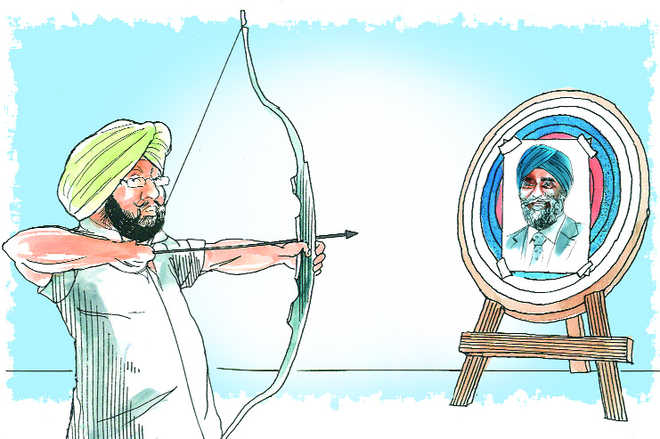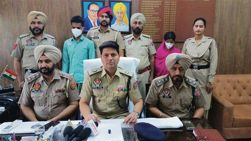
Illustrations by Sandeep Joshi
Harish Khare
SUDDENLY out of nowhere, we find ourselves having to talk about as to how we should be treating the ‘Khalistanis’ in the Canadian Government when they visit Punjab.
I am rather inclined to applaud that the good Captain has brassily stood his ground on not wanting to meet the Canadian Defence Minister, Harjit Singh Sajjan.
Just because a foreign citizen of Indian origin becomes “successful” in another country, he or she is not automatically entitled to our respect or veneration. And, it would be foolish to forget the bottom line: these people have chosen to forsake their allegiance to the land of their forefathers; the convenient presumption, though, is that the NRIs have not cut off their emotional ties with Mother India.
Still, the Diaspora is presumed to be interested — and, is encouraged officially to get involved — in our collective well-being. We woo and court them at the Pravasi Diwas jingbang; each state government has also devised its own forms of NRI sammelans and melas.
In the recent years, the Disapora has regularly chosen to get involved in and divided along party lines — not just in Punjab but also in almost every other part of India. In some states, political parties have an informal quota for the NRIs; assembly constituencies are easily identifiable as “NRI” seats. Political leaders from India are regularly wined and dined or otherwise “honoured” by the mini-Chatwals and the minor-Hindujas among the NRIs. This is a rather transactional relationship.
The Diaspora in North America and England may have an abiding interest in our affairs; but I am not sure they are entitled to any right to “interfere” in the quarrel among the politicians and political parties. But once they choose to take sides, they should be prepared to be treated like any other partisan in a street brawl.
The Captain has a democratic right to put a “Khalistani” tag on Sajjan or his band of fellow-travellers. The Canadian Government has, expectedly, disagreed with the Captain. But it is rather strange that very many groups and leaders in India feel that as Chief Minister, Amarinder Singh is obliged to receive the Canadian Defence Minister.
Let the Defence Minister visit each and every gurdwara he likes; let him be given a siropa at every place; and, he would be entitled to courtesies and protocol. But that should be about it.
It is no secret that that there are vast swathes of the Sikh community, living in Canada and the United States, who subscribe to the memory, history and politics of the “Khalistan movement.” Now this Khalistani tag has acquired a political usefulness in the distant democratic systems, geared to promote multiculturalism. The tricks and tactics of identity politics come into play; there is a political payoff in posing as a “defender” of the “community” or “faith.” Sajjan is a very successful model of this “Khalistani” politics here and there.
***************
ASHWANI Kumar is rather an incongruity in our politics — as perhaps is any educated man. In a way, he represents a dilemma of our times. Political life makes unappetising demands on those who choose to enter its portals. Yet, our public space would be an extremely poor place without the presence of men and women of learning, scholarship and erudition. An evolved polity finds ways of accommodating, listening and, occasionally, rewarding those with cerebral gifts. Demagogues and orators do have their place, but so must the educated and the learned.
I first came to know of Ashwani Kumar as a partisan in the PV Narasimha Rao-Arjun Singh standoff in the mid-1990s. Over the years, I came to respect him as a man of ideas, who was at a great disadvantage in the world of intrigue and conspiracies that is the Congress Party. He was too decent and too much a gentleman to achieve any substantive breakthrough in the direct electoral arena — in that respect, he has Dr Manmohan Singh, Arun Jaitley, Jairam Ramesh, among others, for company. He found his place — but was never granted his peace — in the Rajya Sabha. He was there for fourteen years.
“Hope — In a Challenged Democracy” is a collection of the speeches and articles Ashwani Kumar has penned over the years. The book was released last Monday in Delhi. Put together, the collection is a powerful lament about the decline of the power of persuasion and reason in a democracy — and, a warning against the danger of passions and expediencies of the day overriding the established principles of justice and good governance.
The best reflections are in the section on the Constitution. Particularly thoughtful is the piece Ashwani Kumar wrote after former Prime Minister Manmohan Singh was summoned to stand trial. He wonders “whether the oppressive prosecutorial process of the criminal justice system can be unleashed against a citizen by the court itself…” This is part of his larger argument that our political and judicial processes need to be insulated against the “impulses of transient majorities.”
He does put his finger on a great danger of our system — the judiciary yielding to “public opinion.” And, he quotes a distinguished US Supreme Court Justice, Benjamin N. Cardozo, to make the point that a judge is not free to be a bull in a china shop: “he is not to innovate at pleasure, he is not a knight errant roaming at will in pursuit of his own idea of beauty or of goodness. He is not to yield to spasmodic sentiment, to vague or unregulated benevolence.”
As a Congressman, who “benefited” from the Congress system, Ashwani Kumar is understandably understated in his dissection of what ails India’s oldest political party. The closest he comes to expressing himself is when he laments “the routine triumph of intrigue over integrity, of expediency over principle….” He daringly makes a distinction between “loyalty to the national project and servility to party bosses.”
I would recommend the book to all those who prefer to abide by the values and practices of liberalism and old-fashioned decency.
***************
IF we have survived and prospered as a nation these last seventy years, it is because we are fortunate enough to have had the services of a band of dedicated public servants. Most of the time, such public servants work behind the scene and they mostly remain unsung. Garry Saxena was one such man. He was among the proverbial “wise men” without whose quiet and sagacious advice no system survives for long.
He passed away last Friday.
Garry Saxena was a classic intelligence man, who was twice asked to go to the Raj Bhavan in Srinagar during the days of crisis and collapse. As Governor of Jammu and Kashmir, he formally served four prime ministers — VP Singh, Chandra Shekhar, PV Narasimha Rao and Atal Bihari Vajpayee — but his counsel was sought by every prime minister since Indira Gandhi. During his first stint between May 1990 and March 1993, he saw to it that the authority of the Indian State was restored effectively and efficaciously.
I was fortunate enough to have sat, literally at his feet, a number of times; just listening to him as to how this or that “crisis” was tackled was an education in the principles and practices of statecraft. His memory of men and events remained undiminished till the very last.
India is poorer in his death, because he was an embodiment of the first principle of public office: it is a trust that has to be exercised only in the service of the Indian State. He deserves a salute.
With considerable fanfare, we were informed the other day that the Prime Minister had decreed that “from now onwards, women will not have to change their names in passports after their marriage.” Rather curious. There never was any such requirement in law anyway. I should know; my wife never changed her surname — and, I have been married since 1981.
That calls for coffee, hot and black.


























